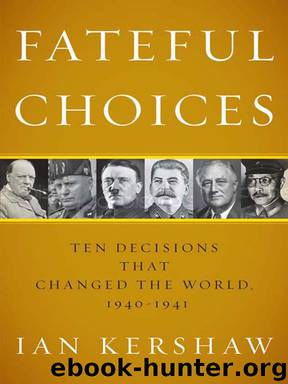Fateful Choices: Ten Decisions That Changed the World, 1940-1941 by Ian Kershaw

Author:Ian Kershaw [Kershaw, Ian]
Language: eng
Format: epub, mobi
Tags: World War; 1939-1945 - Diplomatic History, World War II, World War; 1939-1945, 20th Century, Modern, Holocaust, General, History; Modern - 20th Century, World War; 1939-1945 - Causes, World, Military, History
ISBN: 9780143113720
Google: 4R-ZP27qLOsC
Amazon: 0143113720
Publisher: Penguin
Published: 2007-01-02T08:00:00+00:00
I
In his powerful speech on the evening of 22 June 1941–heard by millions of Americans as they tuned in to their radios that afternoon across the Atlantic–Winston Churchill had specifically linked the fates of the Soviet Union, Great Britain and the United States in the fight against Hitler’s Germany. Hitler’s invasion of the Soviet Union, he had stated, ‘is no more than a prelude to an attempted invasion of the British Isles’. Doubtless Hitler hoped, he added, ‘that all this may be accomplished before the fleet and air power of the United States may intervene’. Should this invasion of Britain take place, he warned, the scene would be set for the final act, ‘the subjugation of the Western Hemisphere to his will and to his system’. The conclusion was evident: ‘The Russian danger is therefore our danger, and the danger of the United States, just as the cause of any Russian fighting for his hearth and home is the cause of free men and free peoples in every quarter of the globe.’9
President Roosevelt was of similar mind, though less decisive in action. A careful (though non-committal) statement put out on 23 June by Sumner Welles (Acting Secretary of State in the temporary absence through illness of Cordell Hull), which the President had approved, indicated that ‘any rallying of the forces opposing Hitlerism, from whatever source’, would benefit the United States’ own defence and security, and ended by reasserting the administration’s long-held view that ‘Hitler’s armies are today the chief dangers of the Americas’.10 But the statement offered nothing concrete. Next day, commenting on Welles’s statement in a press conference, Roosevelt was more forthright. ‘Of course we are going to give all the aid we possibly can to Russia,’ he stated.11 He now released Soviet funds in the United States–amounting to around $40 million–that had previously been frozen, and indicated his readiness to provide aid, noting, however, his ignorance of what was needed. Most significantly, the White House announced on 26 June that the President would not invoke the Neutrality Law against the Soviet Union. This meant that the port of Vladivostok, on the far-eastern rim of the Soviet Union, would, crucially, remain a lifeline for American ships to deliver supplies.12
It all pointed in the right direction. But it was no more than a modest start. The President’s military advisers favoured a bolder course. Henry Stimson, Secretary of War, had sent Roosevelt a memorandum on 23 June, only a day after the German invasion of the Soviet Union, outlining the thoughts of the leading military strategists in the War Department, including those of the chief of staff, George Marshall. Stimson described Germany’s attack as ‘an almost providential occurrence’, allowing the United States a brief respite in which ‘to push with the utmost vigour our movements in the Atlantic theatre of operations’ as the best way ‘to help Britain, to discourage Germany, and to strengthen our own position of defence against our most imminent danger’. The respite, argued Stimson, would last from one to three months.
Download
Fateful Choices: Ten Decisions That Changed the World, 1940-1941 by Ian Kershaw.epub
Fateful Choices: Ten Decisions That Changed the World, 1940-1941 by Ian Kershaw.mobi
This site does not store any files on its server. We only index and link to content provided by other sites. Please contact the content providers to delete copyright contents if any and email us, we'll remove relevant links or contents immediately.
| Africa | Americas |
| Arctic & Antarctica | Asia |
| Australia & Oceania | Europe |
| Middle East | Russia |
| United States | World |
| Ancient Civilizations | Military |
| Historical Study & Educational Resources |
The Ratline by Philippe Sands(1571)
The Holocaust: A New History by Laurence Rees(1521)
The Diary of a Young Girl: The Definitive Edition by Anne Frank; Otto Frank; Mirjam Pressler(1318)
Anne Frank: The Diary of a Young Girl by Anne Frank(1267)
The diary of a young girl: the definitive edition by Anne Frank; Otto Frank; Mirjam Pressler(1231)
Eichmann in Jerusalem by Hannah Arendt(1166)
The Diary of a Young Girl by Frank Ann(1140)
Yes to Life by Viktor E. Frankl(1058)
The New York Times Complete World War II: The Coverage of the Entire Conflict by The New York Times(1003)
Schindler's List by Keneally Thomas(970)
Frank, Anne - The Diary of Anne Frank by Frank Anne(924)
Clara's War by Clara Kramer(910)
Mengele by David G. Marwell(847)
And the Sea Is Never Full by Elie Wiesel(829)
The Pink Triangle: The Nazi War Against Homosexuals by Plant Richard(817)
My Grandfather Would Have Shot Me by Jennifer Teege(813)
The Master Plan by Heather Pringle(805)
All Rivers Run to the Sea: Memoirs by Elie Wiesel(781)
Return to the Reich by Eric Lichtblau(770)
